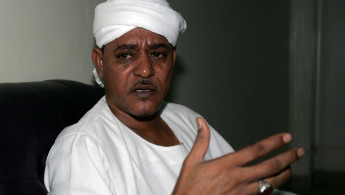Former Darfur Janjaweed leader faces military trial in Sudan
A Sudanese military court on Tuesday resumed proceedings against the former leader of the notorious Janjaweed militias accused of war crimes and genocide in the Darfur conflict.
The Revolutionary Awakening Council (RAC), founded by former Janjaweed chief Musa Hilal, has slammed the military trial.
The RAC alleges that Hilal and dozens of his followers are held as political prisoners and should not be subject to court martial.
The council also claims Hilal's continued detention points to the continued influence of members of ousted President Omar al-Bashir's regime.
The trial "opens the door to ask whether the regime has fallen entirely or not", the RAC said in a statement according to Radio Dabanga.
Supporters of the former Janjaweed leader organised a rally in his stronghold of Misteryia in northern Darfur last week, demanding his release.
Who is Musa Hilal?
Hilal was arrested in 2017 after failing to comply with a disarmament initiative launched by Bashir's regime.
The charges laid against Hilal are in reality more complex.
While the Darfur tribal chief is widely acknowledged to have taken a leading role in the formation of the Janjaweed militias and their subsequent atrocities, none of that could have happened without the backing of the central government helmed by the former dictator.
Hilal was released from prison in 2003, ostensibly to mobilise Arab tribes in the Darfur region against rebel insurgents who accused the government of oppressing non-Arabs.
The Janjaweed instead targeted African-origin Darfuris in an ethnic cleansing campaign that left hundreds of thousands of civilians dead and saw Bashir indicted for war crimes, genocide and crimes against humanity by the International Criminal Court (ICC).
Hilal was also a one-time presidential advisor to the deposed dictator.
But as the Janjaweed chief began to fall out with Bashir - leading to clashes between the Sudanese military and his forces after Hilal quit the ruling party - the star of another Janjweed leader rose.
Gold mines
Former Janjaweed commander Mohammed Hamdan Dagalo, better known by his nickname Hemedti, gained influence in 2013 when he was appointed head of the Rapid Support Forces (RSF).
The RSF is a paramilitary force consisting of former Janjaweed militia members.
Hemedti came into conflict with Hilal over lucrative gold mines located in northern Darfur.
After Hilal split from the ruling National Congress Party and formed the RAC, his forces took control of the gold mines in Jabal Amr.
The RAC leader ultimately fell foul of the regime in 2017, when he was arrested in a power grab some analysts allege was engineered by Hemedti.
Hilal was ostensibly arrested for failing to comply with a Khartoum-launched initiative to have residents of Darfur and South Kordofan handover unauthorised weapons and vehicles to the RSF.
The RSF chief seized the Jabal Amr gold mines from Hilal's forces upon his arrest, making him one of Sudan's wealthiest men.
Hemedti's forces have become the nation's most influential.
His RSF troops have variously served as an EU-funded border force in Sudan and as partners in the Saudi-led coalition in Yemen. They have also been accused of violating the rights of civilians in Sudan's conflict zones Darfur, Blue Nile and South Kordofan.
Hemedti took a leading role when the armed forces overthrew Bashir in April this year.
His forces are widely accused of responsibility for the killing of more than 150 protesters since April, when the RSF chief became deputy leader of the transitional military council.





 Follow the Middle East's top stories in English at The New Arab on Google News
Follow the Middle East's top stories in English at The New Arab on Google News


